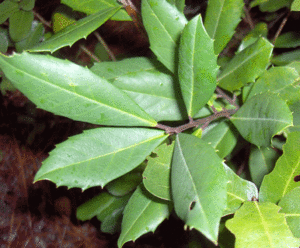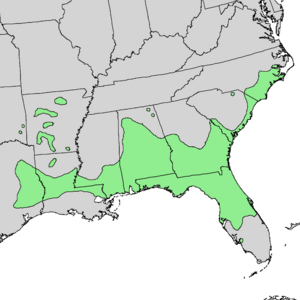Carolina holly facts for kids
Quick facts for kids Carolina holly |
|
|---|---|
 |
|
| Conservation status | |
| Scientific classification | |
| Genus: |
Ilex
|
| Species: |
ambigua
|
 |
|
| Natural range of Ilex ambigua | |
| Synonyms | |
|
|
Ilex ambigua is a type of plant in the holly family. It is commonly called Carolina holly or sand holly. This plant grows naturally in the southeastern and south-central parts of the United States. You can find it along the coastal plain from North Carolina all the way to Texas. It also grows inland in places like Oklahoma, Arkansas, and Tennessee.
What is Carolina Holly Like?
Carolina holly can be a large shrub or a small tree. It can grow up to about 20 feet (6 meters) tall. Its branches have shiny, dark brown or black bark. As the plant gets older, this bark can become flaky. The younger twigs are often purple. Some branches might even have a soft, fine layer of hairs.
The leaves of the Carolina holly can be quite long, up to about 7 inches (18 centimeters). They can also be about 2.8 inches (7 centimeters) wide. The edges of the leaves might be partly or fully toothed, or they can be wavy.
Male and Female Plants
Carolina holly plants are special because they are "dioecious". This means that a single plant will either have only male flowers or only female flowers, but not both. So, you need both a male plant and a female plant for them to make seeds.
The female plants produce a round, red fruit. This fruit is called a drupe, which is a fleshy fruit with a hard pit inside, like a cherry. Animals love to eat these fruits. When they eat the fruits, they help spread the seeds to new places. This is how the plant grows in different areas.
Where Does Carolina Holly Grow?
Carolina holly likes to grow in many kinds of sandy places. You can find it in sandy areas like Florida scrub and hammocks. It also grows in hardwood forests and woodlands.
It often grows alongside different types of pine trees. These include loblolly pine, slash pine, and shortleaf pine. You might also see it growing with various oak species. Sometimes, it even grows near its relative, the American holly.


